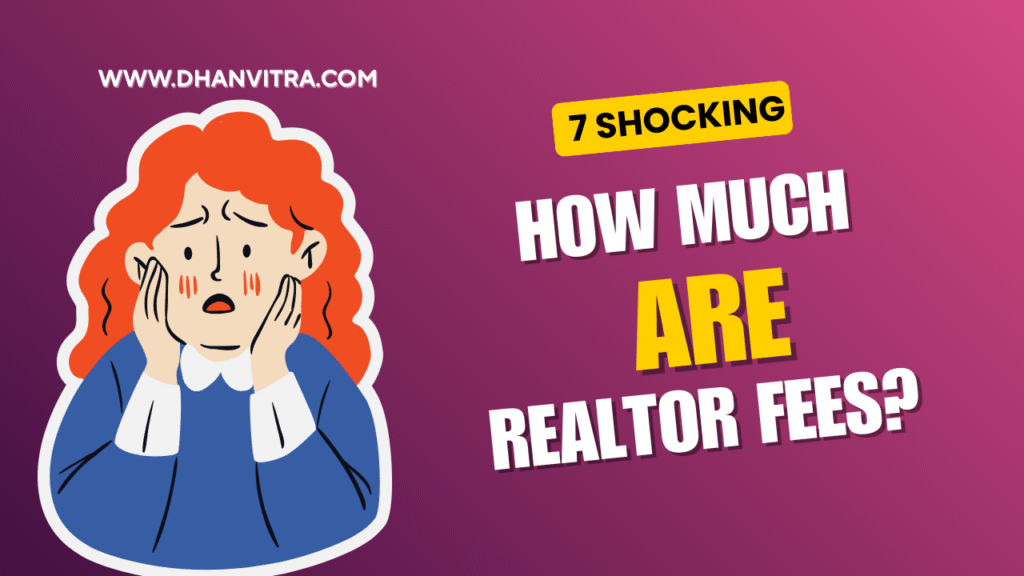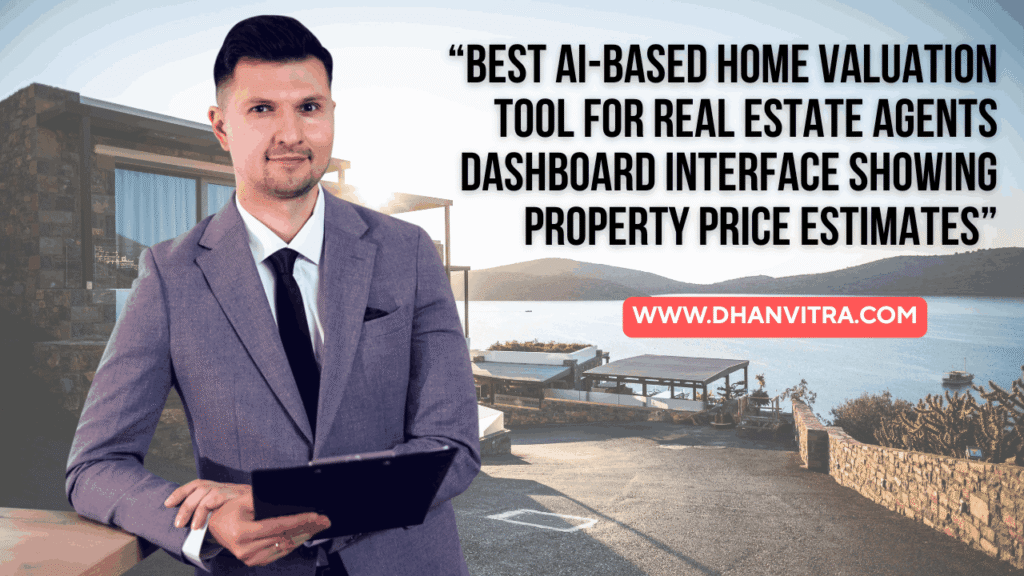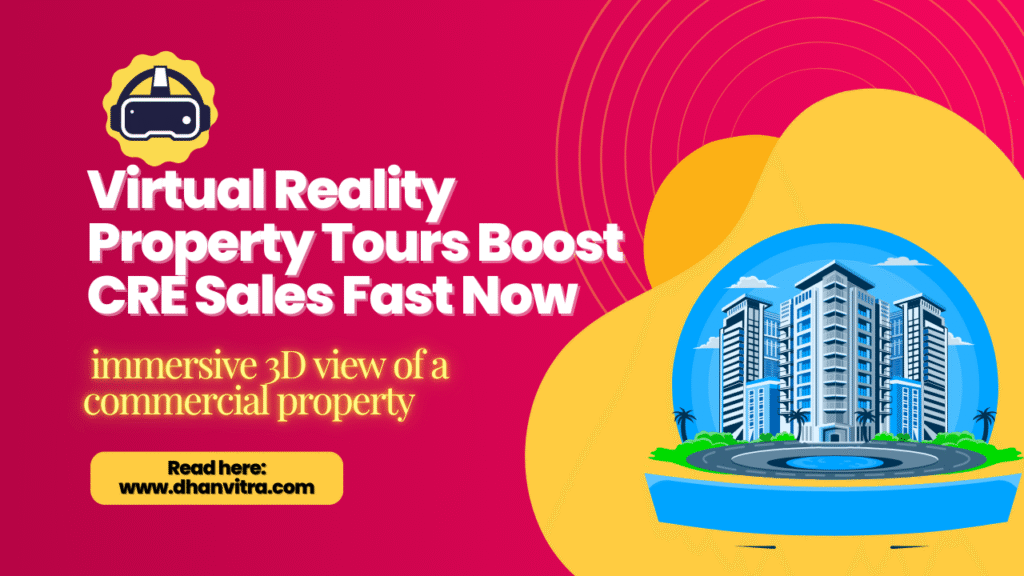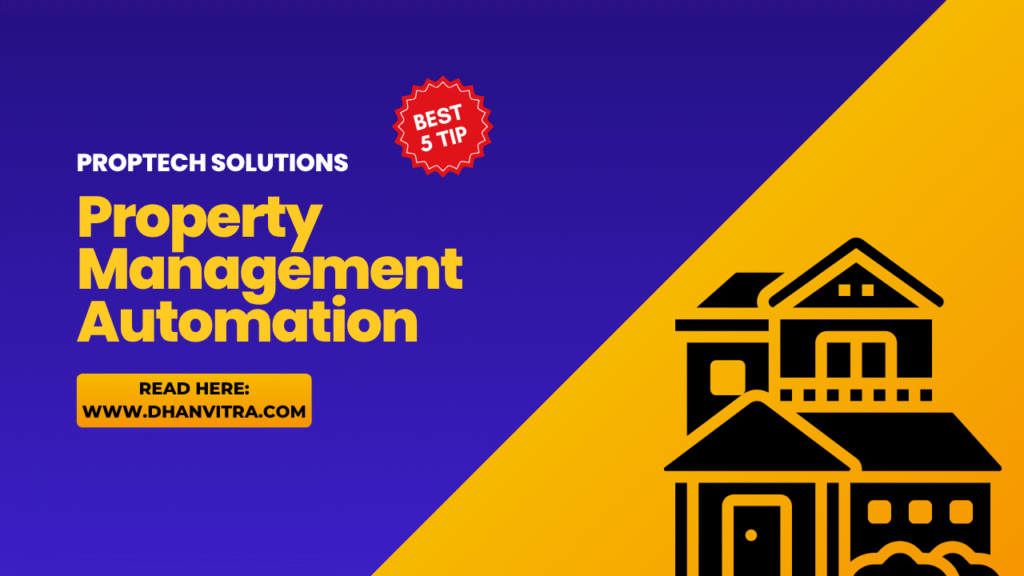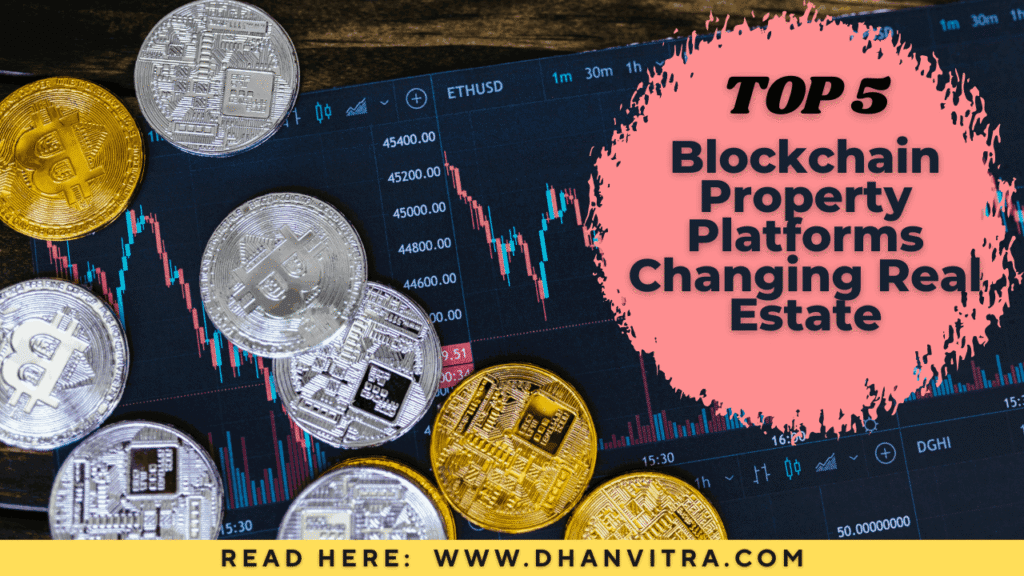
Welcome to Dhanvitra, your go-to platform for the latest insights and trends in finance, investment, and emerging technologies. In today’s rapidly evolving real estate market, traditional property transactions are often slow, complex, and expensive. But thanks to blockchain technology, the real estate landscape is undergoing a revolutionary shift.
In this article, we dive deep into the top 5 blockchain property platforms that are transforming how people buy, sell, and invest in real estate globally. From secure, transparent transactions to fractional property ownership and tokenized assets, blockchain is opening doors for investors and property enthusiasts alike.
Whether you’re a seasoned investor looking to diversify your portfolio or simply curious about the intersection of technology and real estate, this guide will give you an insider’s look at how blockchain is changing the way we think about property. Get ready to explore a new era of fast, secure, and accessible real estate investment.
Table of Contents
Understanding Blockchain in Real Estate
Blockchain technology has moved far beyond cryptocurrency; it’s now carving a transformative path in the real estate sector. To truly appreciate its potential, imagine a world where buying a house doesn’t involve endless paperwork, ambiguous ownership records, or unpredictable middlemen. That’s precisely what blockchain brings to the table—a secure, transparent, and almost frictionless ecosystem.
At its core, blockchain is a decentralized ledger where every transaction is recorded in a way that cannot be altered. This “immutability” ensures that ownership of a property is clearly documented, reducing the risks of fraud or legal disputes. Furthermore, blockchain allows for the use of smart contracts, self-executing agreements coded into the system. These smart contracts automatically enforce conditions—like releasing payment only after a title transfer is confirmed—streamlining what traditionally takes weeks or months into mere hours.
The benefits of blockchain in real estate are global and multifaceted. Investors from any part of the world can participate in property markets that were previously inaccessible due to geographic and legal constraints. Transactions are faster, cheaper, and transparent, and the traditional gatekeepers like banks and brokers see a reduced role, empowering both buyers and sellers. In addition, blockchain enables fractional ownership, meaning people can invest in a portion of a property without needing to buy the entire asset. This opens doors for smaller investors and creates a more inclusive real estate market worldwide.
Criteria for Top Blockchain Property Platforms
When exploring blockchain property platforms, not all are created equal. Several key criteria distinguish the leaders from the laggards, and understanding these is essential for both investors and casual users.
First and foremost is security and transparency. A reliable platform must offer encrypted, tamper-proof records of property ownership and transaction history. Every action, from a simple investment to a full property transfer, should be traceable on the blockchain, ensuring users can verify transactions independently. Without strong security protocols, the very advantage of blockchain—trustless transparency—becomes meaningless.
Next is ease of use and accessibility. The concept of blockchain can seem intimidating, especially for users without technical knowledge. Top platforms invest heavily in user-friendly interfaces, educational resources, and support systems that make navigation intuitive. They simplify complex operations like tokenization, smart contract execution, and cross-border payments, ensuring even newcomers can participate without feeling lost.
Another essential criterion is global reach and adoption. The best blockchain platforms allow users to explore properties worldwide, invest in international assets, and engage in cross-border transactions without excessive regulatory hurdles. Platforms that achieve wide adoption also tend to offer higher liquidity, meaning users can buy or sell their property tokens quickly, just like trading stocks on an exchange.
Top 5 Blockchain Property Platforms
Blockchain has inspired the creation of several innovative property platforms, each with its unique approach to revolutionizing real estate. Let’s dive deep into the five most notable ones shaping the global property market.
1. Propy
Propy has emerged as a global leader in blockchain-powered real estate. What sets Propy apart is its end-to-end transaction platform. From listing a property to closing a deal, every step is digital and blockchain-verified. Propy’s smart contracts ensure automatic enforcement of agreements, reducing the risk of human error or delays.
Investors and property buyers can rely on Propy to complete cross-border transactions efficiently, paying in cryptocurrencies or traditional currencies. The platform also maintains a permanent, immutable record of property ownership, giving users confidence in the legality and security of their investments. Propy has already facilitated high-profile international property sales, proving that blockchain in real estate is not just theoretical but practical and profitable.
2. RealT
RealT is a platform redefining property investment through tokenization, allowing fractional ownership of rental properties in the United States. Instead of purchasing an entire property, investors can buy tokens representing shares of the asset. These tokens grant rights to rental income proportionally, enabling passive income without the hassle of managing property directly.
RealT leverages blockchain to simplify property management, distribution of rental income, and ownership verification. With real-time data on token performance, investors gain transparency that traditional real estate often fails to provide. This approach opens doors for global investors, making U.S. real estate accessible to anyone, anywhere.
3. Atlant
Atlant focuses on tokenizing real estate assets and offering smart contract-enabled property transactions. Its platform allows users to buy, sell, and trade tokenized properties easily, transforming illiquid real estate into a liquid digital asset. Atlant also integrates decentralized finance (DeFi) tools, enabling investors to leverage their tokens in ways previously unimaginable in traditional real estate.
The platform prioritizes security and compliance, ensuring that transactions adhere to regulatory standards while giving users the flexibility of blockchain innovation. Atlant represents a bridge between the conventional property world and the decentralized finance ecosystem, enabling a new era of global investment opportunities.
4. Harbor
Harbor has distinguished itself through a strong focus on regulatory compliance. The platform ensures that every tokenized property investment adheres to local and international laws, making it particularly appealing to institutional investors who require high levels of due diligence.
By leveraging blockchain, Harbor creates secure, transparent, and compliant property transactions. Investors benefit from clear ownership records, reduced operational costs, and streamlined asset transfers. Harbor’s institutional approach demonstrates that blockchain in real estate is not just for individual investors but also for large-scale, regulated investment strategies.
5. Brickblock
Brickblock offers global real estate investment opportunities through tokenized assets. Users can invest in residential and commercial properties across continents without the traditional barriers of local regulations, high minimum investments, or currency exchange issues.
The platform’s intuitive design simplifies investing in complex global markets. Brickblock combines blockchain security with user-centric tools, enabling real-time tracking of asset performance and smooth execution of smart contracts. By making international real estate accessible and efficient, Brickblock empowers both seasoned investors and newcomers to participate in a truly global market.
Advantages of Using Blockchain Property Platforms
Blockchain property platforms are revolutionizing real estate by offering advantages that traditional property transactions could only dream of. One of the most significant benefits is the reduction in costs and fees. By eliminating intermediaries such as brokers, lawyers, and banks, blockchain ensures that a large chunk of transaction fees can be avoided. Investors and buyers save money, and sellers can close deals faster without the overhead of middlemen.
Another game-changing advantage is speed and efficiency. Property transactions traditionally involve weeks, if not months, of paperwork, verification, and coordination. Blockchain platforms automate this with smart contracts, which execute agreements automatically once certain conditions are met. Imagine signing a contract and having ownership transferred in a matter of hours, not weeks. This is particularly valuable for international buyers and sellers, where cross-border transactions usually take much longer.
Blockchain also introduces increased liquidity through tokenization. Instead of owning an entire property, investors can now buy fractional shares, represented as digital tokens on the blockchain. This opens real estate investment to a global audience, allowing smaller investors to diversify their portfolios without massive capital requirements.
Finally, fraud prevention and secure ownership records are unmatched. Since every transaction is recorded on a decentralized ledger that cannot be altered, the risk of title fraud, forged documents, or disputed ownership is drastically reduced. Buyers can verify property history in seconds, giving them unparalleled confidence in their investment.
Challenges and Limitations
While blockchain property platforms are exciting, they are not without challenges. Regulatory hurdles remain a significant obstacle. Real estate laws vary from country to country, and not all governments recognize blockchain-based property transactions. Navigating these legal complexities can be daunting for both platforms and users, and in some cases, compliance issues may delay or restrict property deals.
Another challenge is market adoption. Despite the clear benefits, many traditional real estate stakeholders are hesitant to embrace blockchain. Banks, legal firms, and brokers may resist changes that reduce their role, slowing the overall adoption of blockchain technology in the real estate ecosystem.
Technical knowledge is another limitation. Blockchain platforms can seem intimidating for newcomers who are not familiar with digital wallets, tokenization, or smart contracts. While user-friendly interfaces are improving, there is still a learning curve for investors and property buyers who want to fully understand how blockchain works.
Finally, technology infrastructure in some regions can pose a barrier. Reliable internet connectivity, access to blockchain-compatible devices, and understanding digital identity verification are necessary prerequisites that are not uniformly available worldwide.
Future of Blockchain in Real Estate
The future of blockchain in real estate looks bright and transformative. By 2026 and beyond, experts predict that blockchain could become a mainstream tool for property transactions worldwide. One exciting aspect is global expansion, as cross-border real estate investments become easier and more transparent. Investors in one country could seamlessly purchase shares of properties on another continent without worrying about currency conversions or international paperwork.
Integration with other cutting-edge technologies is another area of tremendous potential. Blockchain, combined with artificial intelligence (AI), the Internet of Things (IoT), and even the metaverse, could redefine property management and investment. For example, AI could analyze blockchain property records to provide predictive insights, while IoT devices could update blockchain records in real-time for property maintenance and occupancy.
Moreover, as regulatory frameworks evolve to recognize blockchain transactions, the adoption rate will likely accelerate. Governments may implement digital land registries, and institutional investors could embrace blockchain platforms as a secure, transparent way to diversify real estate portfolios. This could ultimately lead to a more inclusive, efficient, and globalized property market, breaking down traditional barriers and making real estate accessible to a wider audience.
Blockchain is not just a trend; it is a revolution that is steadily reshaping the real estate landscape, promising faster, safer, and more inclusive property transactions for investors and buyers around the world.
How to Get Started With Blockchain Property Platforms
Diving into blockchain property platforms can feel like stepping into a futuristic world, but it’s more accessible than you might think. The first step is choosing the right platform. Each platform has its own strengths—Propy is perfect for full property purchases with legal backing, RealT excels in fractional ownership, and Atlant or Harbor focuses on tokenized investment opportunities. Take your time to research their reputations, supported countries, and user reviews before committing.
Once you’ve picked a platform, the next step is understanding tokenization and ownership. Blockchain platforms convert real estate assets into digital tokens, which represent a portion of the property. Owning these tokens is like holding a digital deed. For beginners, it might help to start small—investing in a fraction of a property lets you learn the process without risking a huge sum. Knowing how to buy, trade, or redeem these tokens is essential because each platform has a unique interface and token management system.
Legal considerations are crucial. Blockchain real estate is still a regulatory gray area in many countries, and the rules differ widely. Before making any investment, verify the legality of tokenized property ownership in your country. Consult local experts or lawyers who understand both property law and digital assets. Remember, while blockchain promises efficiency and transparency, it doesn’t remove the importance of compliance.
Finally, make sure you prepare your digital tools. This includes setting up a secure digital wallet, understanding cryptocurrency payments if required, and familiarizing yourself with two-factor authentication. These steps protect your investments and ensure a smooth experience as you explore the world of blockchain-enabled real estate.
Conclusion
Blockchain property platforms are not just a trend—they are reshaping how people buy, sell, and invest in real estate globally. They bring speed, transparency, and accessibility to an industry that has long been bogged down by inefficiency. Platforms like Propy, RealT, Atlant, Harbor, and Brickblock are leading the charge, each offering unique features that cater to different types of investors, whether you want to buy a full property, invest fractionally, or explore tokenized real estate opportunities.
For global investors and tech enthusiasts alike, blockchain in real estate represents a new frontier. By understanding the platforms, grasping tokenization, and navigating legal requirements carefully, anyone can tap into these opportunities. The fusion of real estate with blockchain isn’t just about faster transactions—it’s about creating a fairer, more accessible, and globally connected market.
FAQs
What is the easiest blockchain platform for beginners?
For beginners, Propy is often the most straightforward platform because it handles the entire property transaction process, including legal documentation, while providing a user-friendly interface.
Can I buy real estate globally through blockchain platforms?
Yes, many platforms allow international investments, though availability depends on local regulations. Platforms like RealT and Brickblock focus on cross-border accessibility, making global real estate investment feasible.
How secure are these blockchain property platforms?
Blockchain technology itself is highly secure due to its decentralized and immutable nature. However, platform security depends on user practices, like using strong passwords, secure wallets, and two-factor authentication.
What are the costs associated with using blockchain platforms for property?
Costs vary by platform but generally include transaction fees, token purchase fees, and occasionally service fees. Compared to traditional real estate transactions, these costs are often lower because intermediaries are minimized.
Will blockchain replace traditional real estate processes?
Blockchain won’t entirely replace traditional methods immediately, but it will increasingly complement them. Smart contracts, tokenized assets, and digital property records are likely to become standard features in the future of global real estate.



